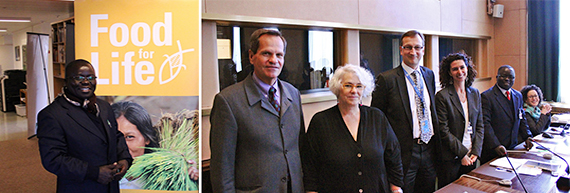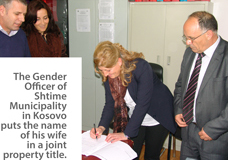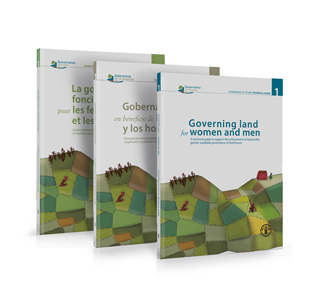Governance of tenure newsletter
1. GETTING TOGETHER: EVENTS ON THE VOLUNTARY GUIDELINES
Coming up: The Voluntary Guidelines 2 years on - Where we are and where we are going
On 14 May a meeting will be held at FAO headquarters in Rome to mark the second year since the CFS’s endorsement of the Voluntary Guidelines. A panel discussion will take place with representatives from governments, civil society and the private sector who will present their perspectives regarding the Voluntary Guidelines. Full interpretation of the meeting will be provided and the event will be webcast. Further information will be provided at a later stage. Partecipate in the discussion during the meeting by using Twitter (#VGGT14May) or sending an email to [email protected] with the subject line heading: “VGGT 14 May Question”.
National workshops in Niger, Senegal and Sierra Leone
A series of national workshops to raise awareness of the Voluntary Guidelines has been launched in 2014, starting with workshops in Niger, Senegal and Sierra Leone. These workshops provided an opportunity for participants from governments, civil society, private sector and research and academia to learn more about the Voluntary Guidelines and to launch multi-stakeholder dialogues on improving the governance of tenure. During this year, FAO will collaborate with national partners in additional countries on similar workshops.
Niger
During 28-30 January, about 70 participants met in Niamey to learn more about the Voluntary Guidelines and how they can be used in Niger. The participants came from the capital as well as from the provinces, and represented government, traditional chiefs, civil society, farmers and pastoral organizations, private sector and academia. The workshop was co-organized by the Ministry of Agriculture and FAO, and was supported with funding from France. In addition to presentations on the Voluntary Guidelines and the Framework and Guidelines for Land Policy in Africa, the content was enriched by presentations of the operational modalities of the Code Rural and an evaluation of its 20 years of existence. The communiqué prepared by the participants emphasized the need for a comprehensive land tenure policy. FAO will continue to work on governance of tenure with the government of Niger including through additional workshops to be held in the coming years.
Senegal
Senegal hosted its first of a planned series of national workshops with 70 participants. The workshop, held in Dakar during 12-14 March, was organized in partnership with the Ministry of Agriculture and Rural Equipment, FAO, IFAD and IPAR (a Senegalese think tank), and France provided funding. A multi-stakeholder committee, comprising representatives from civil society, farmers’ organizations, government, private sector and research, worked beforehand to define the content and format of the workshop. The workshop’s debates were lively and covered topics such as the land tenure security for family farming and agri-business. The participants underlined the need to pursue this dialogue between actors who have rarely had the opportunity to exchange views. The participants agreed on a synthesis of the workshop which was presented to the Minister of Livestock during the closing ceremony. FAO will continue its support for this dialogue on governance of tenure in the coming years.
Sierra Leone
Over 100 stakeholders, including Government and chiefdom representatives, civil society, the private sector, academia and international organizations, discussed the way forward in implementing the Voluntary Guidelines in Sierra Leone at a workshop in Freetown during 3-4 April. The workshop gave participants an opportunity to gain or increase knowledge on the Voluntary Guidelines and to discuss entry points and priorities for their sustainable implementation in Sierra Leone. It was the first of a planned series of workshops that are part of a two and a half year project to support the implementation of the Voluntary Guidelines in Sierra Leone. The workshop was co-organized by the Ministry of Agriculture, Forestry and Food Security and FAO and was financially supported by Germany.
The Voluntary Guidelines at the World Bank Conference on Land and Poverty
 The Voluntary Guidelines were prominent at the annual World Bank Conference on Land and Poverty which was held during 24-28 March and attended by approximately 1 000 participants. An update of the implementation of the Voluntary Guidelines was provided in a specific session and they were the focus of discussion in many other sessions as well. Many participants stopped by the FAO kiosk to obtain publications and posters (more than 700 were distributed) and to watch demonstrations of the first module of the e-learning course of the Voluntary Guidelines and of SOLA, the “Solutions for Open Land Administration” software.
The Voluntary Guidelines were prominent at the annual World Bank Conference on Land and Poverty which was held during 24-28 March and attended by approximately 1 000 participants. An update of the implementation of the Voluntary Guidelines was provided in a specific session and they were the focus of discussion in many other sessions as well. Many participants stopped by the FAO kiosk to obtain publications and posters (more than 700 were distributed) and to watch demonstrations of the first module of the e-learning course of the Voluntary Guidelines and of SOLA, the “Solutions for Open Land Administration” software.
During the conference, FAO presented papers on monitoring the implementation of the Voluntary Guidelines, integrating Voluntary Guidelines principles on gender equality into land administration projects, strengthening the availability of gender-disaggregated data on land ownership, and introducing a legislation assessment tool for gender-equitable land tenure.
The displacement of people and the Voluntary Guidelines
 The complex relationship between conflicts, population displacement, food security and land tenure was the focus of a side-event on the 64th session of the Standing Committee of the UN High Commissioner for Refugees (UNHRC) on 6 March. The role of the Voluntary Guidelines in addressing tenure issues in humanitarian settings was highlighted, including addressing root causes of tenure related disputes and conflicts; resolving disputes over tenure rights; and responses to emergencies (disaster prevention and preparedness programmes; recovery and reconstruction phases).
The complex relationship between conflicts, population displacement, food security and land tenure was the focus of a side-event on the 64th session of the Standing Committee of the UN High Commissioner for Refugees (UNHRC) on 6 March. The role of the Voluntary Guidelines in addressing tenure issues in humanitarian settings was highlighted, including addressing root causes of tenure related disputes and conflicts; resolving disputes over tenure rights; and responses to emergencies (disaster prevention and preparedness programmes; recovery and reconstruction phases).
This side-event on “Population Displacement and Return and Land Tenure” was organized by the Ecumenical Advocacy Alliance, with the support of the Swiss Federal Department of Foreign Affairs and the Swiss Agency for Development and Cooperation, and included the participation of FAO.
During the event Ms Janice Marshall, Deputy Director, Division of International Protection, UNHCR, noted that land tenure issues can be the cause of IDP/refugee displacement, as well as presenting challenges during their displacement and upon their return. She welcomed the Voluntary Guidelines as a tool to deal with such challenges.
2. STORIES FROM THE FIELD: USING THE VOLUNTARY GUIDELINES
Land and gender in the Western Balkans
 Improved access to gender-disaggregated data can be a catalyst to improving gender equality and provide opportunities for the so-called “Third Sector” of non-governmental and local organizations, especially those representing women. The Voluntary Guidelines underline that gender equality is at the core of all processes and aspects of tenure governance, including policy formulation, service delivery, and access to legal systems and information.
Improved access to gender-disaggregated data can be a catalyst to improving gender equality and provide opportunities for the so-called “Third Sector” of non-governmental and local organizations, especially those representing women. The Voluntary Guidelines underline that gender equality is at the core of all processes and aspects of tenure governance, including policy formulation, service delivery, and access to legal systems and information.
FAO, the World Bank and the World Bank Institute are working together to streamline the Voluntary Guidelines principles on gender equality into ongoing Land Administration projects in Albania, Bosnia and Herzegovina, Kosovo, FYR Macedonia, Montenegro and into the design of a new project in Serbia. Seven reform teams, comprising government policy makers, technical experts, private sector notaries and NGOs, have been established and trained to design plans to streamline gender equality in their countries over a period of 11 months. As part of these plans, gender-disaggregated reports have been generated from the land administration information technology (IT) systems in all six countries and the reform teams will be trained in the use of those data for evidence-based policy making. The gender-disaggregated reports show that although women and men have equal status in law in relation to property as well as equal access to information, local customs, cultural norms, and traditions prevail over laws in some places and amongst certain groups. Gender-disaggregated data have been further linked to the spatial data to show the most critical geographical areas, where further efforts should be focused.
By supporting countries to formulate reform proposal to make land administration services more accessible to vulnerable groups, including women, the programme helps them close the gender gaps in access to economic opportunities as well as meeting the Millennium Development Goals.
Don‘t miss out on the leaflet giving an overview of the relation between land and gender in the Western Balkans:
New SOLA release is available online
 A new update of SOLA (Solutions for Open Land Administration software) is now available (Release 1402a) for download in three forms. The release updates the SOLA Release Candidate with over 150 bug fixes and enhancements. The release contains new features, including the following: • Support for large scale First Registration activities using SOLA's Systematic Registration features • Russian, Arabic and French translations for the SOLA Desktop application • Bulk loading of spatial features from shapefile • Support for importing GPS coordinate data files generated by Trimble Pathfinder software • Multiple coordinate systems support allowing users to project features into different coordinate systems from the SOLA Map Viewer • Bulk assignment of applications to users • Mandatory recording of gender for right holders and applicants to promote gender equality in tenure rights for land, fisheries and forests • Text field watermark to provide example data entry values (for dates, etc.) • Export of selected spatial features to KML for display in Google Earth • Configurable user password expiry • Compliance with enhanced Java Web Start security requirements introduced by Oracle in recent Java updates The SOLA Development Team would like to invite members of the SOLA Community, in particular developers working in the land administration area and potential users of SOLA to review and comment on Release 1402a. Comments can be sent via email to [email protected] and the team will endeavour to respond to your feedback. Download and read more about SOLA Release 1402a at:
A new update of SOLA (Solutions for Open Land Administration software) is now available (Release 1402a) for download in three forms. The release updates the SOLA Release Candidate with over 150 bug fixes and enhancements. The release contains new features, including the following: • Support for large scale First Registration activities using SOLA's Systematic Registration features • Russian, Arabic and French translations for the SOLA Desktop application • Bulk loading of spatial features from shapefile • Support for importing GPS coordinate data files generated by Trimble Pathfinder software • Multiple coordinate systems support allowing users to project features into different coordinate systems from the SOLA Map Viewer • Bulk assignment of applications to users • Mandatory recording of gender for right holders and applicants to promote gender equality in tenure rights for land, fisheries and forests • Text field watermark to provide example data entry values (for dates, etc.) • Export of selected spatial features to KML for display in Google Earth • Configurable user password expiry • Compliance with enhanced Java Web Start security requirements introduced by Oracle in recent Java updates The SOLA Development Team would like to invite members of the SOLA Community, in particular developers working in the land administration area and potential users of SOLA to review and comment on Release 1402a. Comments can be sent via email to [email protected] and the team will endeavour to respond to your feedback. Download and read more about SOLA Release 1402a at:
3. TECHNICAL PUBLICATIONS ON THE VOLUNTARY GUIDELINES ![]()
"Introduction to the Responsible Governance of Tenure" is now available in French and Spanish
The introductory e-learning module is now available in French and Spanish as well as English. It illustrates what is meant by “responsible governance of tenure” and identifies responsible ways of governing the use and control of land, fisheries and forests.
"Strengthening forest tenure systems and governance"
This training module for facilitators includes training agendas with detailed instructions and session plans, advice on the preparation of multi-stakeholder dialogue on tenure and much more.

Technical guide "Governing land for women and men" is now available in French
This Guide is now available in French as well as English and Spanish. It includes case studies, examples, checklists, and suggested monitoring indicators to improve gender equity in the processes, institutions, and activities of land tenure governance. EN | FR | SP
Technical guide Respecting free, prior and informed consent is now available in Spanish
The Guide is now available in Spanish as well as English. This sets out practical actions to respect and protect free, prior and informed consent (FPIC). It shows how Government agencies, civil society organizations, land users and private investors can comply with their responsibilities in relation to FPIC. EN | SP
4. SUPPORT FOR THE VOLUNTARY GUIDELINES
European Parliament calls for the implementation of the Voluntary Guidelines
European Parliament calls for the implementation of the Voluntary Guidelines The European Parliament has adopted a resolution on the role of property rights, property ownership and wealth creation in eradicating poverty and fostering sustainable development in developing countries. The resolution, adopted on 13 March 2014, calls for the implementation of the Voluntary Guidelines and recommends that property rights and land tenure security, for everyone, be included as an objective on the post-2015 development agenda.
The resolution notes that there is a need to prioritize land reform due to the fact that “land governance issues are closely linked with the key challenges of the 21st century, namely food security, energy scarcity, urban and population growth, environmental degradation, climate change, natural disasters and conflict resolution”. To read the full resolution click here: EN| FR | SP
UN Special Rapporteur on the Right to Food calls for implementation of the Voluntary Guidelines
At the 25th Session of the UN Human Rights Council, UN Special Rapporteur on the Right to Food Olivier De Schutter presented his final report, conclusions, and key recommendations on achieving food security, which includes an encouragement for States to implement the Voluntary Guidelines. The report is based on country-level research in thirteen countries, including low, middle and high-income countries. In addition, missions were undertaken to WTO and FAO to determine their contributions regarding eradication of hunger and malnutrition.
In the key recommendations, access to land and other natural resources is recognized as one of the key elements in achieving food security and the report emphasizes the importance of taking actions on ensuring tenure rights. In this regard, Olivier De Schutter states that: “… it is crucial that States strengthen the protection of land users and implement the Voluntary Guidelines on Responsible Governance of Tenure of Land and other Natural Resources.” Read the full report: EN| FR | SP
